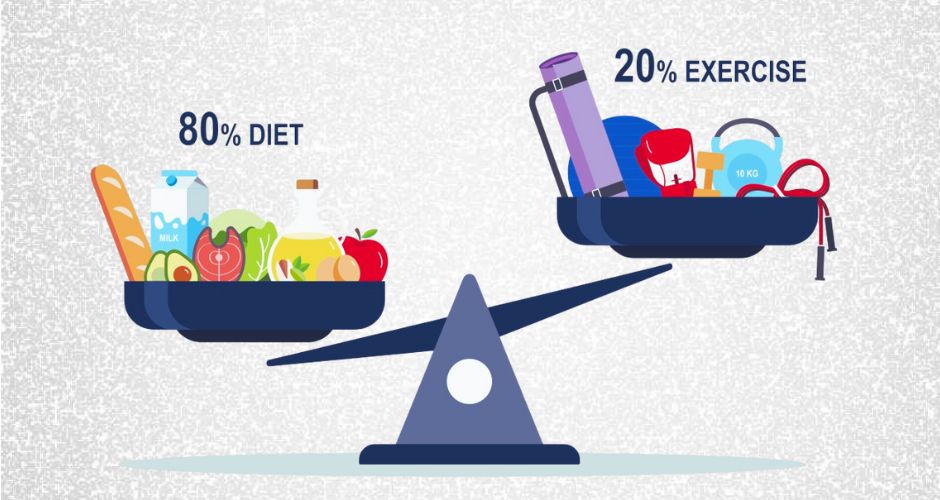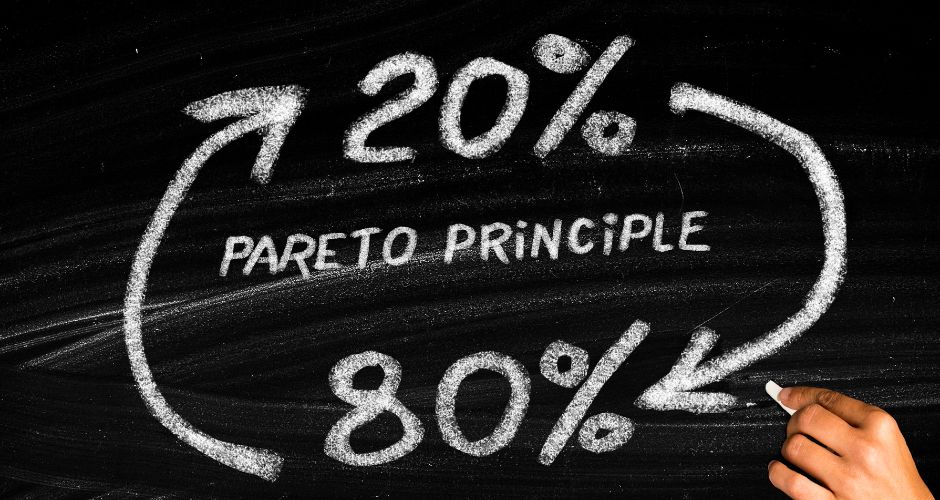What is 80/20 Rule for Weight Loss?

In the world of dieting and weight loss, it’s easy to get caught up in extremes: strict meal plans, rigorous exercise routines, and an all-or-nothing mentality. However, a more balanced approach, known as the 80/20 rule, is gaining popularity. But what exactly is this rule, and how can it help you achieve your weight loss goals? Let’s delve into the concept and explore its benefits.
What is the 80/20 Rule?
The 80/20 rule, also known as the Pareto Principle, suggests that 80% of your results come from 20% of your efforts. Applied to weight loss, it means focusing on making healthy choices 80% of the time while allowing for flexibility and indulgence the remaining 20% of the time. It’s about finding a sustainable balance between discipline and enjoyment in your lifestyle.
The 80/20 rule isn’t so much a strict rule as it is a concept that suggests weight loss can be attained by prioritizing healthy eating habits 80% of the time and dedicating the remaining 20% to exercise.
Understanding the Principle
At its core, the 80/20 rule promotes consistency rather than perfection. It acknowledges that no one can eat ideally or exercise rigorously 100% of the time, nor should they have to. By prioritizing nutritious foods, regular physical activity, and overall healthy habits most of the time, you can still achieve significant progress while allowing yourself the freedom to enjoy occasional treats or relaxation without guilt.

Implementing the 80/20 Rule
Implementing the 80/20 rule for weight loss involves incorporating balanced and mindful choices into your daily routine while allowing occasional indulgences. Here’s how to effectively implement the 80/20 rule:
Nutrition
- Focus on Nutrient-Dense Foods: Aim to make nutritious choices for approximately 80% of your meals and snacks. Fill your plate with various fruits, vegetables, lean proteins, whole grains, and healthy fats.
- Portion Control: Practice portion control to ensure you’re consuming appropriate serving sizes of foods. Use smaller plates, measure out servings, and be mindful of portion sizes to avoid overeating.
- Meal Planning: Plan your meals and snacks ahead of time to ensure you have nutritious options readily available. Prepare healthy meals in advance to avoid relying on less healthy convenience foods during busy times.
- Allow for Indulgences: Reserve the remaining 20% of your diet for indulgences or less nutritious foods. Enjoy your favorite treats in moderation, savoring them mindfully and without guilt.
Exercise
- Regular Physical Activity: Aim for regular exercise most days of the week, focusing on activities you enjoy. Incorporate a mix of cardiovascular exercise, strength training, and flexibility exercises to promote overall fitness and well-being.
- Variety: Keep your exercise routine varied and interesting to prevent boredom and maintain motivation. Try different workouts, outdoor activities, or fitness classes to keep things fresh and enjoyable.
- Rest and Recovery: Allow rest days and recovery time in your exercise routine to prevent burnout and reduce the risk of injury. Listen to your body and permit yourself to rest when needed.
Mindful Eating
- Pay Attention to Hunger and Fullness: Listen to your body’s hunger and fullness cues to guide your eating habits. Eat when you’re hungry and stop when you’re satisfied, rather than eating based on external cues or emotions.
- Slow Down: Eat slowly and mindfully, savoring each bite and paying attention to the flavors and textures of your food. This can help prevent overeating and promote greater satisfaction with meals.
- Enjoy Treats Mindfully: Do so mindfully when indulging in less healthy foods or treats. Eat slowly, savoring each bite, and watch how the food makes you feel. Avoid distractions and focus on the experience of enjoying the treat.
Benefits of the 80/20 Rule
The 80/20 rule, also known as the Pareto Principle, offers numerous benefits for weight loss and overall well-being:
- Sustainability: Unlike strict diets that require constant adherence to rigid rules, the 80/20 rule promotes a sustainable approach to weight loss. By allowing for flexibility and occasional indulgences, individuals are more likely to stick to their healthy habits in the long term.
- Flexibility: The 80/20 rule provides flexibility in dietary choices, allowing individuals to enjoy their favorite foods in moderation without feeling deprived. This flexibility reduces feelings of restriction and promotes a healthier relationship with food.
- Mindful Eating: By practicing the 80/20 rule, individuals learn to practice mindful eating. They become more aware of their food choices and eating behaviors, allowing them to enjoy indulgences without overdoing them. This cautious approach fosters a greater appreciation for food and enhances meal satisfaction.
- Emotional Well-being: Following the 80/20 rule helps prevent feelings of guilt or failure associated with occasional indulgences. Allowing treats and less healthy options in moderation will enable individuals to enjoy social occasions and special events without the negative emotional consequences often associated with strict diets.
- Long-Term Success: The 80/20 rule promotes sustainable lifestyle changes rather than short-term fixes. Individuals are more likely to achieve and maintain their weight loss goals in the long run by focusing on making healthy choices while allowing for occasional indulgences.
Conclusion
The 80/20 rule offers a refreshing perspective on weight loss, emphasizing balance, moderation, and sustainability. By prioritizing healthy choices most of the time while allowing for flexibility and enjoyment, you can achieve your weight loss goals without sacrificing your sanity or happiness. So, embrace the 80/20 rule and discover a more balanced and fulfilling approach to achieving a healthier lifestyle.






